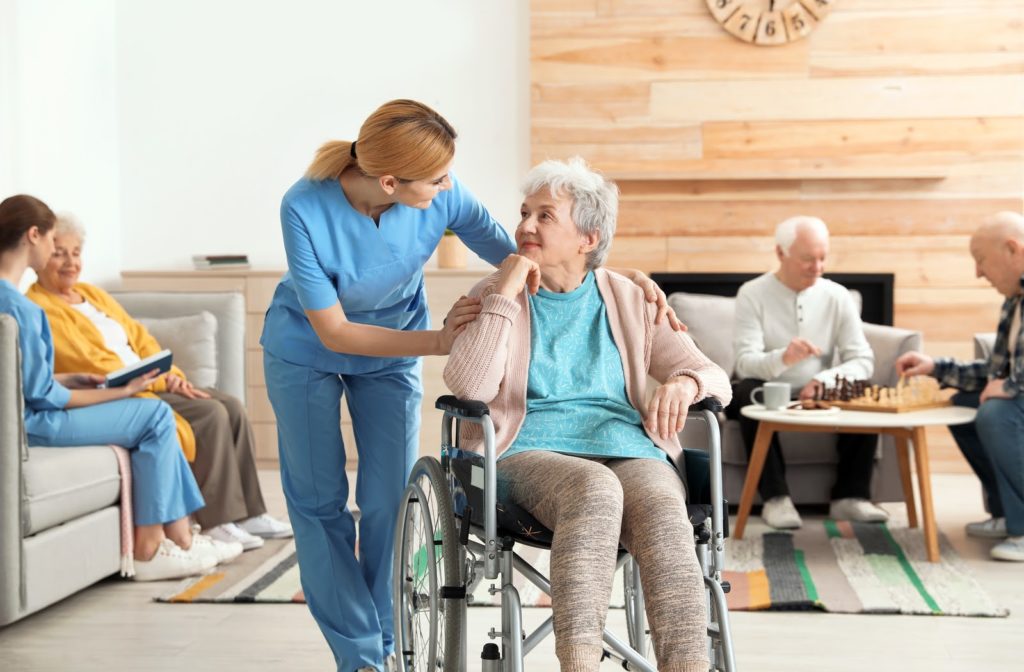Discover the top-rated Memory Care programs with experienced caregivers.
Wiki Article
The Function of Assisted Residing In Giving Specialized Care for Dementia Sufferers
The arrangement of specialized take care of dementia individuals within nursing home is increasingly acknowledged as a crucial part of effective dementia administration. These atmospheres are made to address the distinct cognitive and emotional obstacles encountered by people with mental deterioration, offering tailored support that promotes safety and well-being. By integrating structured routines and appealing activities, helped living can reduce feelings of isolation while enhancing overall high quality of life. The efficiency of these programs commonly pivots on different elements, including staff training and family members participation, triggering a more detailed evaluation of how these components connect to enhance care outcomes.Recognizing Mental Deterioration Care Requirements
Understanding the treatment needs of people with dementia is important for offering reliable support and improving their lifestyle. Mental deterioration is a progressive neurological problem that impacts cognitive functions such as memory, thinking, and communication. As a result, people with dementia usually require support with everyday tasks, personalized treatment strategies, and emotional assistance.Reliable dementia care involves recognizing the one-of-a-kind challenges dealt with by each person. This consists of understanding the stages of dementia, which can vary from moderate cognitive impairment to sophisticated stages calling for comprehensive support. Care needs might encompass support in handling everyday regimens, drug adherence, and keeping social interactions to stop seclusion.
In addition, sensory excitement and acquainted settings can dramatically enhance the wellness of people with mental deterioration. Caretakers need to be educated to recognize behavior adjustments and employ techniques tailored to each person's preferences and past experiences. Strategies such as validation treatment and reminiscence can help communicate effectively and foster a complacency.
Inevitably, successfully addressing the care demands of people with mental deterioration needs a caring technique, continuous training for caregivers, and a commitment to keeping self-respect and respect throughout the caregiving process.
Benefits of Assisted Living

Assisted living advertises social communication amongst homeowners, cultivating a feeling of area and belonging. Involving with peers can alleviate feelings of isolation, which are common in those living with dementia.
On top of that, numerous nursing home offer support with daily activities, such as medication management, bathing, and meal preparation. This support enables homeowners to keep their freedom while guaranteeing their health and wellness and wellness are prioritized. Ultimately, assisted living acts as an important resource, balancing treatment and freedom for individuals with dementia and their families.

Specialized Programs and Tasks
(Memory Care Charlotte)Identifying the one-of-a-kind needs of people with mental deterioration, many assisted living facilities implement specialized programs and tasks made to boost cognitive feature and promote overall health. These programs usually include cognitive stimulation tasks that involve citizens in memory video games, puzzles, and memory therapy, which encourages the sharing of individual tales and past experiences.In addition, art and songs therapy play substantial functions in fostering creative thinking and emotional expression (Memory Care). Engaging homeowners in paint, crafting, or music sessions can give restorative benefits, assisting to reduce anxiousness and improve state of mind. Physical activities, such as gentle workouts and dance sessions, are also critical, as they promote mobility and physical health and wellness while encouraging social interaction among homeowners
Structured day-to-day routines are commonly established to offer a feeling of stability and predictability for individuals with mental deterioration. These routines can consist of set up meal times, team tasks, and personalized care strategies that cater to specific rate of interests and capacities. By creating an improving setting loaded with customized tasks, aided living facilities not just boost the lifestyle for dementia clients however additionally cultivate a sense of neighborhood and belonging.
Trained Team and Support
(Memory Care Charlotte)In aided living facilities, the visibility of qualified team is important for offering effective support to people with dementia. These specialists possess specialized understanding and abilities to attend to the one-of-a-kind requirements of residents, guaranteeing their safety, comfort, and health. Personnel obtain training in dementia treatment, that includes comprehending the development of the illness, identifying behavioral modifications, and using effective communication methods.Furthermore, qualified personnel are equipped to carry out personalized care plans customized per resident's preferences and capabilities. This personalized strategy promotes a feeling of freedom and self-respect, permitting locals to participate in significant activities that improve their top quality of life. The team also play a vital role in checking wellness and health, promptly identifying any modifications in problem that may need medical interest.
Along with guide care, skilled personnel supply psychological assistance to citizens, aiding to relieve sensations of complication and stress and anxiety that commonly come with mental deterioration. Their caring technique produces a nurturing environment where residents really feel valued and recognized - Assisted Living. Eventually, the experience and devotion of experienced team are crucial in supplying detailed care that meets the intricate demands of individuals living with mental deterioration in assisted living setups
Household Involvement and Resources
Family participation plays a considerable role in the treatment of individuals with mental deterioration in nursing home. Engaging member of the family in the care procedure not only boosts the psychological well-being of the homeowner however also cultivates a collaborative environment where treatment plans can be customized to individual demands. Families can give important understandings right into the preferences, background, and behaviors of their enjoyed ones, which can educate caregivers and bring about more personalized care methods.
Moreover, helped living centers typically offer sources for family members, such as support system and educational workshops. These resources can assist family members understand dementia, enhance interaction strategies, and establish coping devices. Involvement in these programs can equip family members, outfitting them with the tools essential to support next their loved ones successfully.
Additionally, regular interaction in between family members and personnel is critical. This ongoing dialogue enables family members to remain informed regarding their liked one's progression and any modifications in treatment strategies. Ultimately, a strong collaboration between family members and aided living centers promotes an environment of count on and understanding, making sure that people with mental deterioration obtain the specialized treatment they deserve while maintaining their family connections.
Conclusion
In verdict, aided living facilities play a vital role in attending to the special demands of dementia patients via customized care and assistance. Ultimately, assisted living gives necessary resources that dramatically boost the high quality of life for those living with dementia.Report this wiki page